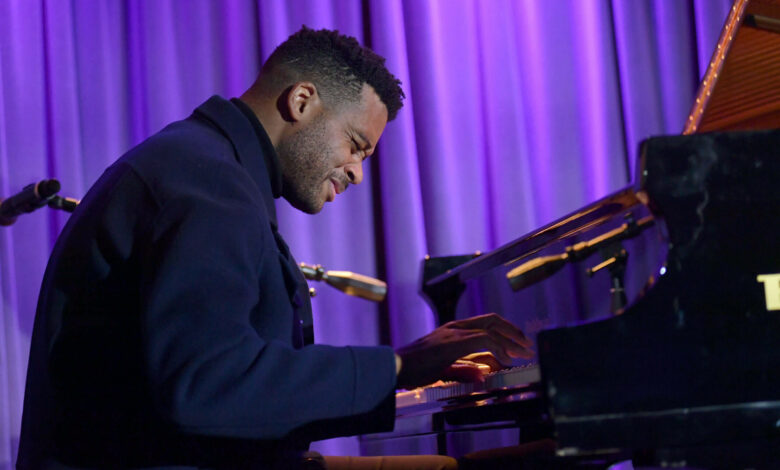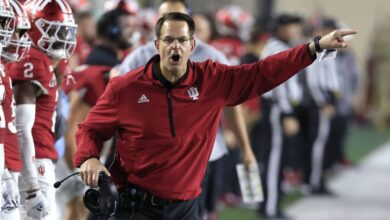How an Emmy-winning composer and 85 musicians created the College Football 25 theme song

They gathered in a 100-year-old Gothic church turned recording studio a few blocks from Vanderbilt’s Nashville campus. Eighty-five musicians, with their brass, wind and percussion instruments, cycled through the sanctuary to contribute to a unique task: recording a song befitting the grandeur of a college football video game’s return.
Outside, the rumble of a spring storm sounded and a brood of crickets chirped tirelessly. Inside, the orchestra created “Campus Clash,” the theme song for EA Sports College Football 25, perhaps the most anticipated sports video game of the past decade.
Steve Schnur, Electronic Arts’ worldwide president and chief music officer, felt the game’s revival deserved a track that was unique, yet true to the sport’s traditional sound. He recruited Emmy-winning composer Kris Bowers to craft an arrangement and assembled the orchestra to produce an original track that would stand out among the game’s extensive library of fight songs and rousers.
A video game soundtrack can quickly become an earworm as players sink hours into the game. It needs to be not only bearable, but also enjoyable to replay. That could be especially true for College Football 25, which released this week after an 11-year hiatus since the last NCAA football game.

GO DEEPER
Official EA Sports College Football 25 Review: The Hype Was More Than Worth It
“Campus Clash” features a strong brass melody and a funky drumline beat with a swagger. It wouldn’t be out of place as a hype-building theme for the opening of a primetime game show, but Schnur is adamant that nostalgia isn’t the only ingredient.
“This is not going to sound like the band you heard on a marching band field in 1985 or 2005,” he said.
More than 2,000 miles away from Nashville, Bowers listened to the recording while working from his Los Angeles studio. Best known for composing the scores for films like “Green Book” and “The Color Purple” and the Netflix hit series “Bridgerton,” Bowers is also a video game veteran, having composed for two previous versions of Madden and also penned the main themes for the upcoming Madden 25 and NHL 25 games.
Bowers, a two-time Juilliard graduate with bachelor’s and master’s degrees in jazz performance, didn’t get much exposure to the sounds of college sports as an undergrad because the prestigious performing arts school doesn’t have athletic teams. To write something that would fit the game-day atmosphere, he studied the sound of college marching bands. Schnur sent him the fight songs in the game to “get an idea of little drumline phrases that might be interesting to borrow” for the original composition, Bowers said.
“It’s definitely a fusion of sounds, but the most important thing for us was that it had this balance between a classic football theme that we’ve heard before, but at the same time had a modern feel that felt a little bit different from what you’ve been hearing on TV for decades,” Bowers said.
To achieve this, Bowers drew from contemporary marching band songs, with a focus on hip-hop songs that utilize brass melodies. Beyoncé’s 2018 Coachella performance, which paid tribute to HBCUs, and Mystikal’s “Bouncin’ Back (Bumpin’ Me Against The Wall)” were two major inspirations.
Bowers begins his composition process by determining the emotion of the scene (or, in this case, the game). He wants the piece to make him feel the same way. Composing for video games can be challenging, as there are no narrative beats to guide a shifting sound or punctuation mark like in shows and movies. For this release, it was all about creating something that excited gamers.

GO DEEPER
Why the return of a video game is so important to college football fans, players and coaches
The goal is to extend the theme beyond just the game and embed it in the culture of college American football.
“Hopefully in the future we can include other bands doing their version of it,” Bowers said. “Now that we have this version of it, we want the melody and the main melodic aspect of the theme to be something that sticks, but we also want it to have a life of its own in terms of how it’s played and performed from now on. Ideally, if people really embrace that, we could celebrate other schools doing their versions.”
Required reading
(Photo by Kris Bowers: Unique Nicole/Getty Images for The Recording Academy)




